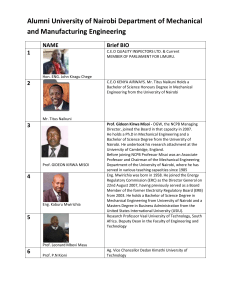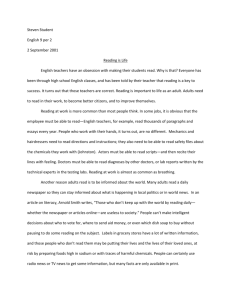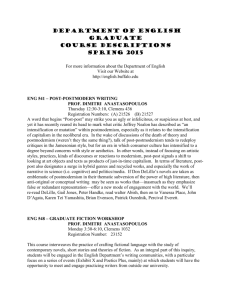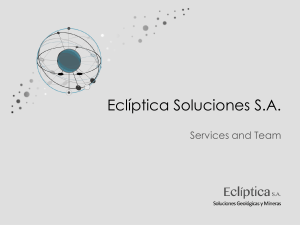Fall 2014 - University at Buffalo
advertisement
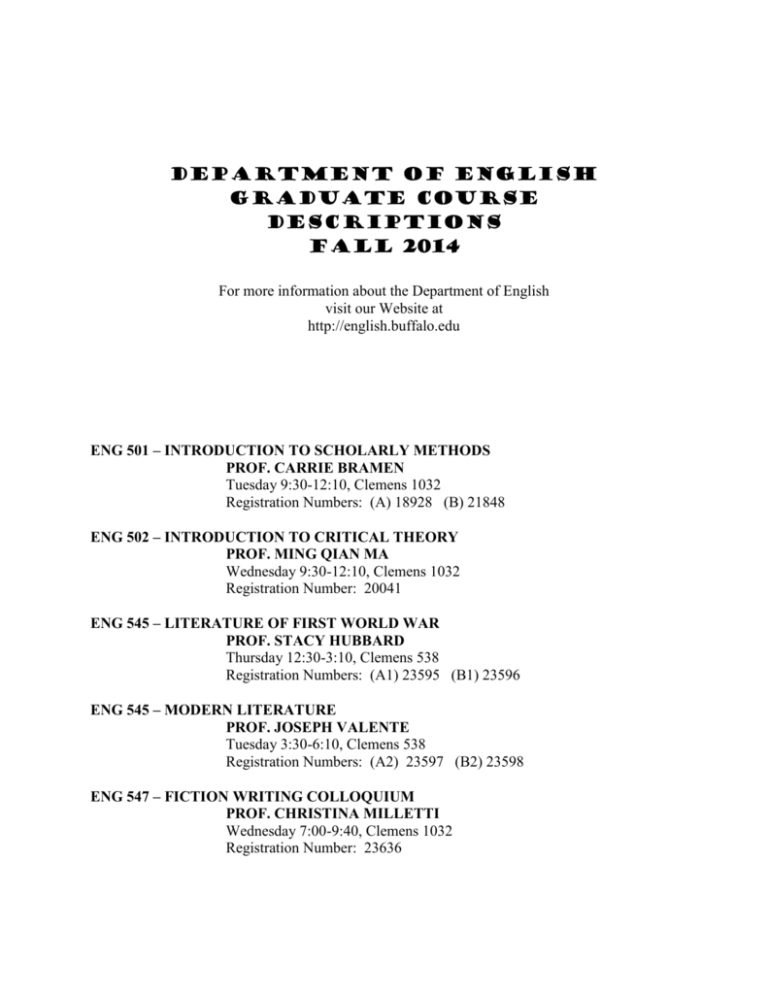
Department of english Graduate course Descriptions Fall 2014 For more information about the Department of English visit our Website at http://english.buffalo.edu ENG 501 – INTRODUCTION TO SCHOLARLY METHODS PROF. CARRIE BRAMEN Tuesday 9:30-12:10, Clemens 1032 Registration Numbers: (A) 18928 (B) 21848 ENG 502 – INTRODUCTION TO CRITICAL THEORY PROF. MING QIAN MA Wednesday 9:30-12:10, Clemens 1032 Registration Number: 20041 ENG 545 – LITERATURE OF FIRST WORLD WAR PROF. STACY HUBBARD Thursday 12:30-3:10, Clemens 538 Registration Numbers: (A1) 23595 (B1) 23596 ENG 545 – MODERN LITERATURE PROF. JOSEPH VALENTE Tuesday 3:30-6:10, Clemens 538 Registration Numbers: (A2) 23597 (B2) 23598 ENG 547 – FICTION WRITING COLLOQUIUM PROF. CHRISTINA MILLETTI Wednesday 7:00-9:40, Clemens 1032 Registration Number: 23636 ENG 549 – POETRY WRITING COLLOQUIUM PROF. MYUNG MI KIM Wednesday 7:00-9:40, Clemens 436 Registration Number: 23637 ENG 576 – LITERATURE & SOCIETY (TRANSLATION) PROF. WALTER HAKALA Monday 12:30-3:10, Clemens 1032 Registration Numbers: (A) 23606 (B) 23607 ENG 586 – CRIME FICTION PROF. DAVID SCHMID Monday 12:30-3:10, Clemens 538 Registration Numbers: (A) 22501 (B) 22502 ENG 599 – PRACTICUM IN TEACHING PROF. ALEX REID Tuesday 12:30-3:10, Clemens 538 Registration Number: 18455 ENG 609 – STUDIES IN 19TH CENTURY AMERICAN LITERATURE PROF. KENNETH DAUBER Tuesday 12:30-3:10, Clemens 436 Registration Numbers: (A) 23609 (B) 23610 ENG 645 – MULTIMODALITY IN THE NOVEL PROF. JOSEPH CONTE Wednesday 12:30-3:10, Clemens 538 Registration Numbers: (A ) 23614 (B) 23615 ENG 651 – THEORIES OF FEELING: AFFECT THEORY PROF. RACHEL ABLOW Friday 12:30-3:10, CLEMENS 1032 Registration Numbers: (A) 23616 (B) 23617 ENG 656 – SOCIAL DOCUMENTATION PROF. BRUCE JACKSON Monday 3:30-6:10, Clemens 610 Registration Numbers: (A) 23620 (B) 23621 ENG 698/APY 515 - CROSSCULTURAL POETICS PROF. DENNIS TEDLOCK Wednesday 3:30-6:10, Clemens 538 Registration Numbers: (A) 23622 (B) 23623 ENG 501 – INTRODUCTION TO SCHOLARLY METHODS PROF. CARRIE BRAMEN Tuesday 9:30-12:10, Clemens 1032 Registration Numbers: (A) 18928 (B) 21848 All new students in the English Department’s Masters Program are required to take English 501, which is designated Introduction to Scholarly Methods. This course is in turn divided into two sections, A and B, which have different formats: the A section is a conventional seminar, whereas the B section does not have a common meeting time, but instead consists in individual advisement tailored to your specific needs. All new M.A. Program students must enroll in the A section, and full-time students should also enroll in the B section. (Full-time students can enroll in the A section on-line, and they will be automatically enrolled in the B section.) English 501 A is intended to enhance our familiarity and facility with the kinds of questions literary scholars ask today and their strategies for answering them. We will therefore study various critical approaches and gain a grounding in research methods. Research into the composition, publication, and critical history of a text of your own choosing (in consultation with me) will form the basis of writing assignments and an oral presentation. (Please note that while the A and B sections of this course can count toward your eight-semester requirement for the M.A. and while the A section is required for all new M.A. students, neither the A nor the B section of this course counts toward the four intensive seminars required for the degree.) ENG 502 – INTRODUCTION TO CRITICAL THEORY PROF. MING QIAN MA Wednesday 9:30-12:10, Clemens 1032 Registration Number: 20041 Designed as a survey class, English 502 is intended to introduce students to the critical theories of the 20th- and 21st-Centuries, with an emphasis on the post 1960s period. Chronological in approach, it will study the founding or representative texts of various schools or types of theories and criticisms, focusing on their working assumptions, grounding perceptions, constitutive concepts, paradigmatic formations, and corresponding methodologies. The objective of this course is to further prepare students for their more advanced studies at the graduate level by 1) providing an overview/review of the critical and theoretical discourses fundamental to literary and interdisciplinary studies; 2) offering an intensified learning process aiming at cultivating an intellectual rigor in the accuracy of understanding and articulation, and in cogency of thinking and writing; 3) presenting opportunities to practice literary criticism by applying these theories to readings of literature for the purpose of learning a range of interpretative methods; and 4) improving and refining a diacritical sensitivity toward not only the significance but also the limitations of each type of critical theories. Course assignments include one 40-minute presentations, weekly response papers, three short papers of literary criticism, and a term paper. Textbooks required for the course: Literary Theory: An Anthology, 2nd Edition. Edited by Julie Rivkin and Michael Ryan. Blackwell, 2004. Billy Budd, Sailor and Other Tales, by Herman Melville; with a new introduction by Joyce Carol Oates. Signet Classics, 1998. (Other editions are acceptable.) Supplementary reading materials will be distributed in the form of handouts. ENG 545 – BLASTING AND BLESSING: THE LITERATURE OF THE FIRST WORLD WAR PROF. STACY HUBBARD Thursday 12:30-3:10, Clemens 538 Registration Numbers: (A) 23595 (B) 23596 According to Vincent Sherry, modernist studies has barely begun to take account of the central event of the early twentieth century---the First World War (which began 100 years ago this August). This is in part because of the continuing tendency to disjoin the more radical aesthetic experiments of the war period from historical reference, and to cede the ground of testimony to realist memoirs and genteel poetry. In this course, I’d like to reopen the question of where the First World War is to be found in modern (and modernist) writing. We will read some of the more famous memoirists—such as Robert Graves, Ernst Junger and Vera Brittain—and the soldier poets—Blunden, Sassoon, Owen, Rosenberg— but we’ll also look at works by non-combatants--such as Gertrude Stein, Willa Cather, and W.C.Williams--who were actively engaged in processing (and sometimes anticipating) the shock of the war aesthetically and psychologically. In addition to addressing how the war and the influenza pandemic that followed impacted social and psychological life between 1914 and 1919 and during the decade that followed, we’ll also think about the profound influences of the war experience on visual paradigms, theories of force and violence, representations of sound, machine culture, landscape, body consciousness, memory and trauma, cosmopolitanism and gender. We will read the “high modernists” next to the realists and the social protest writers, the Edwardian and Georgian poets together with the imagists, Vorticists, Futurists and feminists. And, importantly, we will examine not only anti-war writers and elegists, but also those writers, such as Wyndham Lewis and Ernst Junger, who were exhilarated and energized by battle and developed aesthetics that celebrated force, dynamism and machine culture. Time permitting, we will also give some attention to visual art and film. Among our readings will be selections from historical materials about the war and its aftermath by G. J. Meyer (whose A World Undone: The Story of the Great War provides an excellent, readable overview of the war years), Modris Eksteins, Hew Strachan, Jay Winter, and others.; theoretical materials on trauma, memory, and violence by Sigmund Freud, Dominick LaCapra, Cathy Caruth, Klaus Theweleit and others; and a wide range of critical materials about modernism and the war. Literary readings will include novels, stories, memoirs, poems, plays and manifestoes from among the following: Robert Graves’s Goodbye to All That, Vera Brittain’s Testament of Youth (excerpts), Ernst Junger’s Storm of Steel, Wyndham Lewis’s Blasting and Bombardiering and Blast I & II, Virginia Woolf’s Mrs. Dalloway (and/or Jacob’s Room), Rebecca West’s The Return of the Soldier, Willa Cather’s One of Ours, Ernest Hemingway’s In Our Time, John Dos Passos’s 1919, Edna St. Vincent Millay’s Aria de Capo, Franco Marinetti’s “Futurist Manifesto,” and poems by Gertrude Stein, H.D., T.S. Eliot, Marianne Moore, W.B.Yeats, Edmund Blunden, Wilfred Owen, Siegfried Sassoon, Isaac Rosenberg, W.C. Williams, e.e. cummings, D.H.Lawrence, Thomas Hardy, Guillaume Apollinaire, Henri Gaudier-Brzeska, Tristan Tzara, and others. We will make use of the university’s Special Collections for poetry materials, manifestoes and little magazines and spend some time exploring the extensive Robert Graves papers. Additional archival work will be possible using on-line materials available through the Oxford First World War Poetry site and the Imperial War Museum site. Requirements include diligent attendance and participation; frequent discussion board entries; several brief oral presentations; a short review essay; and an end-of-term essay appropriate for presentation at an academic conference. ENG 545 – QUEER IRISH MODERNISM PROF. JOSEPH VALENTE Tuesday 3:30-6:10, Clemens 538 Registration Numbers: (A) 23597 (B) 23598 If English language modernism primarily enacts a spirit of literary experimentation, manifest in a series of formal and stylistic breaks with the conventions of nineteenth century realism, then it might be said to have its origins, as Vicki Mahaffey has argued in States of Desire, with the Irish writer of the fin-de-siecle and the early Celtic Renaissance—with Oscar Wilde, Bram Stoker, George Moore, Augusta Gregory, W.B. Yeats, John Synge, and the young James Joyce. This Irish vanguardism is most often attributed to the social and political contradictions, the internal divisions and antagonisms and the instabilities of national identity formation attendant to Ireland’s long, unevenly developed colonial occupation and its more recent, more intensive metrocolonial assimilation. An advanced Irish Modernism, in short, has typically been viewed through a postcolonial lens with a distinctively ethnic point of emphasis. Without departing entirely from that approach, this course will examine how the Irish response to and intervention in the evolving sexual codes, mores and understanding at century’s turn not only accompanied but entailed new strategies of literary representation. The winds of sexual change (the emergence of Freudian psychoanalysis, the prominence of music hall culture, the trials of Oscar Wilde and the “discovery” of homosexuality, birth control, the new woman, eugenics, etc.) inspired a certain ambivalence on Irish shores blowing East to West, from the European and specifically the English metropole, these winds could be, and often were, interpreted as a foreign incursion into the Catholicidentified, familialistic native culture. Relieving certain of the most repressive aspects of that culture, however, these winds could also be, and sometimes were, treated as a most welcome guest. We will be looking at how some of the signature authors and works of the period stage this conflict between sexual defensiveness and sexual dissidence and in the process invented (Irish) modernism. ENG 547 –FICTION WRITING COLLOQUIUM PROF. CHRISTINA MILLETTI Wednesday 7:00-9:40, Clemens 1032 Registration Number: 23636 ENG 549 – POETRY WRITING COLLOQUIUM PROF. MYUNG MI KIM Wednesday 7:00-9:40, Clemens 436 Registration Number: 23637 In this unique Colloquium course, we will examine a broad array of aesthetic techniques deployed in poetry and fiction in order to explore and reassess question of genre to which we’ve become anaesthetized. Specifically, we will think through what function the concept of genre performs, what kinds of writing activity genre allows us to pursue, and how mobilizing the question of genre itself may help writers foster innovative sites of practice. Predominantly exploratory in nature, the Fall Writing Colloquium is designed to investigate the limits and boundaries of poetry and fiction by negotiating three interrelated spheres of activity: 1) Sharing student projects in writing. 2) Reading a wide range of texts in order to become familiar not only with contemporary writing, but also critical and theoretical concepts that will augment writing practice. 3) Participating in several Colloquia sessions during which the two sections of the class will meet to prepare for and discuss visits by an exceptional roster of writers: poets, novelists, short story writers, and writers of cross-genre and inter-genre forms. ENG 547: Fiction Writing Colloquium Students who are currently working on projects in fiction are invited to register for ENG 547 with Prof. Christina Milletti. ENG 549: Poetry Writing Colloquium Students who are currently working on projects in poetry are invited to register for ENG 549 with Prof. Myung Mi Kim. ENG 576 – LITERATURE & SOCIETY (TRANSLATION) PROF. WALTER HAKALA Monday 12:30-3:10, Clemens 1032 Registration Numbers: (A) 23606 (B) 23607 Translation: Theory and Practice ENG 576 - Lit & Society (Translation) M 12:30-3:10 pm Prof. Walter N. Hakala (English and Asian Studies) “I want translations with copious footnotes, footnotes reaching up like skyscrapers to the top of this or that page so as to leave only the gleam of one textual line between commentary and eternity.” Vladimir Nabokov, “Problems in Translation: Onegin in English.” Partisan Review 22, no. 4 (1955): 512. This seminar will examine the theories and practices associated with translation in European, African, and Asian languages. As such, it will also serve as a pedagogy proseminar for those intending to teach world literatures. We will examine major works, ancient to contemporary, pairing each unit with an exercise in literary translation. We will begin with theories of translation and the methods of textual criticism that emerged from Greek, Latin, and Hebrew literary traditions. Diglossia and the relationship between so-called “cosmopolitan” and “vernacular” languages shall be the focus of our investigations into the medieval and early modern periods. We will move to discussions of the politics of translation, cultural identity, and pragmatics in our study of colonial and post-colonial translation practices. Readings for the course may include selections from: • Lawrence Venuti (ed.), The Translation Studies Reader, 2nd or 3rd eds • including works by Jerome, Schleiermacher, Benjamin, Nabokov, Jakobson, Appiah, Derrida • George Steiner, After Babel • Bart D. Ehrman, Misquoting Jesus • Rita Copeland, Rhetoric, Hermeneutics, and Translation in the Middle Ages: Academic Traditions and Vernacular Texts • Daniel Heller-Roazen and Muhsin Mahdi (eds.), The Arabian Nights, trans. Husain Haddawy • Robert Irwin, The Arabian Nights: A Companion • Simon Digby, Richard Burton: The Indian Making of an Arabist • Christi Merrill, Riddles of Belonging: India in Translation and Other Tales of Possession • Vijayadānna Dethā, Chouboli and Other Stories Seminar participants will be responsible for leading a classroom discussion and preparing a synthesizing “cheat sheet” for one set of readings. Additional brief written exercises may include: (a) an application of methods of textual criticism to the source text(s) of a verse (or set of verses) in a non-English edition of the Christian New Testament (b) the genealogy of a passage or section drawn from a non-English version of The Arabian Nights. If there is sufficient interest, we may schedule a trip to the Cleveland Public Library to view its massive collection of Arabian Nights translations. (c) drawing inspiration (and caution) from Ezra Pound’s Cathay, participants may attempt to transcreate a poetic genre (e.g., the Urdu ghazal or Somali heello) in English using literal translations and scholarly commentaries (d) an exploration of how various “world Englishes” (such as Salman Rushdie’s “chutnefied” prose) resist translation into other languages Intensively enrolled students are also required to complete a practical translation project by preparing (e) a prospectus and oral presentation of a proposed final project (due in early October); (f) a translation as part of the approved project (due at the end of the semester); and (g) a final paper on any aspect of translation. Participants are encouraged to connect this paper with the practical translation project described above. A working knowledge (i.e., adequate to carry out translation projects for this course) of at least one language other than English is a prerequisite for the course. Feel free to contact me (walterha@buffalo.edu) with any questions. ENG 586 – CRIME FICTION PROF. DAVID SCHMID Monday 12:30-3:10, Clemens 538 Registration Numbers: (A) 22501 (B) 22502 The consummate ‘guilty pleasure’ of academics, crime fiction was for many years dismissed as not worthy of serious critical attention while also consumed avidly behind closed doors. Recently, however, there has been an explosion of critical work about crime fiction that helps explain the resilience of this diverse and complex popular genre. As Glenn W. Most and William W. Stowe put it in their introduction to The Poetics of Murder: Detective Fiction and Literary Theory, “[T]he criticism of detective fiction has never been healthier or more wide-ranging than it is today. Taking advantage of their popularity, their relative simplicity and their clear position as a model for other kinds of narrative, contemporary literary critics and theorists have used detective novels as test cases and examples for all sorts of literary speculation, from investigations of narrative techniques to discussions of the social function of literature, its psychological effects, and the philosophical systems it assumes and promotes.” The aim of this seminar is to survey a selection of both the most important examples of mystery writing and the most influential examples of recent criticism. Our focus throughout the semester will be on the narrative techniques used by crime fiction writers to create character, structure plot, and maintain suspense. As we can tell a lot about a society from the way it discusses crime and punishment, we will also study how these novels and short stories provide miniature social histories of the periods in which they were written. Course Texts Edgar Allan Poe Sir Arthur Conan Doyle Sir Arthur Conan Doyle Agatha Christie Dashiell Hammett Raymond Chandler Dorothy Hughes Cornell Woolrich David Goodis Mickey Spillane Patricia Highsmith Chester Himes Jim Thompson Sara Paretsky Umberto Eco The Murders in the Rue Morgue: the Dupin Stories Six Great Sherlock Holmes Stories The Sign of Four The Murder of Roger Ackroyd The Maltese Falcon The Big Sleep In A Lonely Place Rendezvous in Black Shoot the Piano Player Kiss Me, Deadly Strangers On A Train Cotton Comes to Harlem The Killer Inside Me Blood Shot The Name of the Rose Course Requirements Students taking the class extensively are required to write short (2-3 page) response papers for each of our meetings, and a 5-7 page mid-term paper. Students taking the class intensively are also required to write a 20-25 page research paper. ENG 599 – PRACTICUM IN TEACHING PROF. ALEX REID Tuesday 12:30-3:10, Clemens 538 Registration Number: 18455 This course is designed to support and develop TA pedagogy in the composition program at UB. The course will examine foundational and contemporary scholarship and research in rhetoric and composition that addresses first-year composition pedagogy. The course will serve as a forum for the discussion of classroom practices and issues as they arise during the semester and situate those discussion within the context of composition theory. We will investigate the historical development of first-year composition, the current debates regarding such courses, and the potential futures of writing instruction. ENG 609 – NINETEENTH -CENTURY AMERICAN LITERATURE PROF. KENNETH DAUBER Tuesday 12:30-3:10, Clemens 436 Registration Numbers: (A) 23609 (B) 23610 Theory of American Literature. This course is designed to give you a roadmap of the variety of ways of talking about classic American literature through readings in the literature of the period and, especially, through a thorough immersion in a wide range of theories about how that literature is to be approached. Reading will be heavy, about two books a week—one a primary text and one a secondary text on the nature of American writing in which that primary text plays a central role. We will read deconstructions, works of cultural criticism, ordinary language criticism, feminism, new historicism—some oldies (like Leslie Fiedler’s Love and Death in the American Novel or D. H. Lawrence’s Studies in Classic American Literature), some newies (Stanley Cavell on Thoreau and Emerson, Donald Pease on cultural critique), some in between, some as yet to be determined. The list will be chosen on the basis of what seems current, what seems enduring, and what I haven’t read yet but meant to because it seems promising. Primary texts will include Benjamin Franklin’s Autobiography, Uncle Tom’s Cabin alongside some slave narratives (probably Douglass and Jacobs), some novels of Hawthorne, (especially The House of the Seven Gables), some of Melville (especially Pierre), a chunk of Emerson’s best, a few of the earliest American novels (Brockden Brown, maybe Fenimore Cooper), and others (Poe? Thoreau?). By the end of the course, if you are faithful, you will have an extraordinary sense of how the founding period in American literature lays itself out, what the debates about it are, what works and what doesn’t. I tend to be very opinionated about such matters. The course is designed to enable you to form your own (hopefully different) opinions, as well. ENG 645 – MULTIMODALITY IN THE NOVEL PROF. JOSEPH CONTE Wednesday 12:30-3:10, Clemens 538 Registration Numbers: (A) 23614 (B) 23615 In this seminar on innovative fiction, we will examine the contraindicated persistence of multimodality in print novels; or, books you can’t read on a Kindle™. Alison Gibbons defines multimodality as “the coexistence of more than one semiotic mode within a given context.” We experience multimodality as the environment of our daily life, in various platforms that include the urban streetscape, art galleries, digital “desktops” and other electronic media. Multimodality is as new as the iPhone with its app icons and voice assistance, but as old as the New England Primer’s abecedarium. Multimodal literature may be regarded as both the resistance to and the appropriation of digital technology in the print medium. Most literary works are monomodal and language-centered; they call on the reader’s store of linguistic competency and comprehension of the symbolic mode, but they subordinate or exclude the iconic and indexical modes. But multimodal literature exhibits polysemiosis: the reader encounters two or more semiotic modes and recognizes that they are not autonomous meaning systems but semantically interrelated. The experience of reading a multimodal text requires that the reader—in the broadest sense of the word—negotiate between systems of meaning, not merely within the rule of one mode. The relation between the verbal text, visual icon and indexical design is one that is cognized rather than decoded. So the study and reception of multimodal literatures requires the development of a cognitive poetics. Each of the multimodal books that we will peruse exhibits a “set” toward a dominant mode while retaining reference to all others: the book can trend toward a. transparency, or the set toward narrative, mimesis or character; b. opacity, or the set toward the form of the novel; c. code, or the set toward the visual appearance, the icon; or d. base, or the set toward the form of the book. We will want to examine the effects of multiple reading paths on narrative structure; the physical manipulation required to read one or more of these books; the relationship between the semiotic modes of the graphical and textual in all of these books; the “self-conscious” reading that is required by works that call attention to themselves as books; or the metafictive reflexivity of these works as fictions; etc. Works for extended discussion will include: Mark Z. Danielewski’s Only Revolutions (2006); Jonathan Safran Foer’s Tree of Codes (2010); Alison Gibbons’s Multimodality, Cognition, and Experimental Literature (2011); B. S. Johnson’s The Unfortunates (2009); Emily McVarish’s The Square (2009); Vladimir Nabokov’s The Original of Laura (Dying is Fun) (2008); Art Spiegelman’s MetaMaus: A Look Inside a Modern Classic (2011); and Steve Tomasula’s VAS: An Opera in Flatland (2004). Other literary and critical readings will be available through UB Learns or on graduate course reserve. Course requirements will include a twenty-minute seminar presentation by all enrolled students and a twenty-page research paper from those students registered intensively. ENG 651 – THEORIES OF FEELING PROF. RACHEL ABLOW Friday 12:30-3:10, Clemens 1032 Registration Numbers: (A) 23616 (B) 23617 This course has three principal aims. The first is to define the range of meanings that are commonly attached to “affect” and “affect theory.” Although lots of theorists and critics invoke these terms, they are often drawing on extremely different philosophical traditions. We will thus compare Spinozist understandings of the “affect” with those offered by sylvan Tomkins—and we will consider both in relation to neuro-scientific work that is currently being popularized, and to the “new materialisms.” The second aim of the course is to consider the question of why affect has recently become such a hot topic: what kind of theoretical, political, social, or aesthetic work is the term being used to do that seem substantially different from what has come before. Specifically, we will consider why affect has proven so appealing to theorists and critics considering a wide range of issues having to do with the body: sexuality, disability, gender, race, nationality, migration, biopolitics, necropolitics, the carceral state, environmentalism, the relation between human and non-human animals, etc. We will also ask how that work is related to pre-existing movements, theories, or problematics. Here we will focus in particular on the ways in which affect has come to be bound up with critiques of poststructuralist approaches to power and the subject. How has affect come to be identified with the conditions of possibility for positive political transformation? What is its relation to the subject—and so, too, with questions of identity and agency? Related to these questions is the third goal of this course: that of attempting to determine the limits of affect. We will attempt to determine exactly what gets left out of discussions of affect: what kinds of political problems can it not help us approach, and what kinds of sensations, emotions, experiences, intensities, etc. have to drop out of the conversation. Writers for the course will include Sarah Ahmed, Jane Bennett, Lauren Berlant, Teresa Brennan, Wendy Brown, Veena Das, Gilles Deleuze, Antonio Domasio, Michael Hardt, Ruth Leys, Brian Massumi, Sianne Ngai, Jasbir Puar, Eve Sedgwick, Rei Terada, Michael Warner, and others. Please note that this course will not duplicate Prof. Judith Goldman’s spring 2014 course on affect. ENG 698 ~ APY 515 – CROSS-CULTURAL POETICS PROF. DENNIS TEDLOCK Wednesday 3:30-6:10, Clemens 538 Registration Numbers: (A) 23622 (B) 23623 Office hours – T W 9:30-noon and by appointment dtedlock@buffalo.edu All things vivid in history, all the different cultures, are no longer obstacles that separate us from the essential and the Intelligible; rather, they are the paths by which we can reach it. Furthermore, they are unique pathways, the only possible paths, irreplaceable, and consequently implicated in the Intelligible itself! —Emmanuel Levinas The cross-cultural world is a decolonizing world, horizontal more than hierarchical, simultaneous or anachronistic rather than divided into stages of development. Cultures (and languages) are themselves heterogeneous more than homogeneous. And so with poetry and poetics, by which we mean the verbal arts in general. Our tracing of poetic paths through this cross-cultural world will be guided, in part, by strategic reversals. We will listen to oral performances that are or once were guided by texts, and we will read texts that are or once were guided by oral performances (a problem not laid to rest by the literature on the Homeric texts). Our questioning of the notion of a “definitive text” in the literate world will bring us up against performances that aim at verbatim reproduction in the oral world. Along the way, we might want to reconsider Plato’s critique of writing in the Phaedrus. Following a poetics widely practiced in the contemporary West, the poet, even when freed from rhyme and meter, aims at finding exactly the right words and avoids paraphrase. At the opposite extreme is a poetics widely practiced in most of the rest of the world, whereby paraphrase (or intralingual translation) is the main method by which a poem is constructed in the first place. The former poetics belongs to the same tradition as the notion of an original language in which words and their objects had an essential connection, while the latter poetics continuously celebrates the fact that anything and everything can be said in more than one way. But lest we go too far in the antiessentialist direction, the notion of the arbitrariness of signs runs up against the fact that every language abounds in ideophonic words. Especially bird names. Readings will include translations of verbal arts in various African, Asian, and Amerindian languages, along with an avant-garde American poet’s epic. There will also be listenings that bring in a wide range of recorded performances, some of them matched (or mismatched) to transcripts. Some of our meetings will involve experiments in the re-oralizing of texts, or experiments in the transcription of oral performances. Weekly one-page response papers will be required, along with a project that may take the form of a term paper—or, alternatively, a transcription and/or translation and/or performance. Reading and listening: David Antin, selected talks and essays from Radical Coherency; Matsuo Basho, The Narrow Road to the Interior, translated by Sam Hamhill; Ed Dorn, Gunslinger; Steve Feld, Voices of the Rainforest: A Day in the Life of the Kaluli People (Papua New Guinea, audio CD); Isidore Okpewho, Once upon a Kingdom: Myth, Hegemony, and Identity (Igbo epic); Jerome Rothenberg, Technicians of the Sacred; Dennis Tedlock, selected essays and Finding the Center: The Art of the Zuni Storyteller. Recommended reference works: Folklore, Cultural Performances, and Popular Entertainments, edited by Richard Bauman; Key Terms in Language and Culture, edited by Alessandro Duranti.
